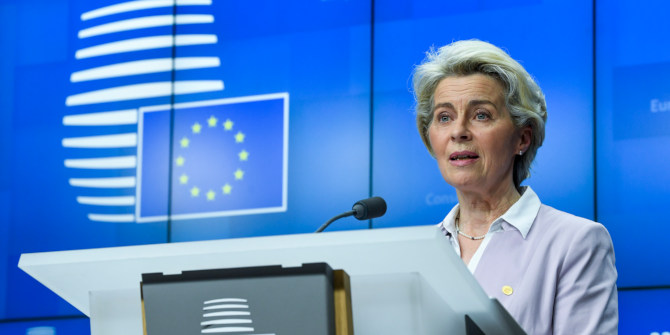Earlier this month, several major newspapers published a letter from more than a hundred economists calling for the ECB to cancel the government debt it holds. Paul De Grauwe argues that even if the ECB did cancel this debt, nothing of substance would change economically for national governments.
The recent publication of a proposal made by more than a hundred economists to cancel the government debt held by the European Central Bank has reignited the discussion about the role of the central bank in supporting the government. The question that many ask themselves is whether this proposal is to be taken seriously. In order to answer this question, it is good to go back to the basics of fiat money creation.
When the central bank buys government bonds, say in the context of quantitative easing, it substitutes interest bearing government bonds for monetary liabilities (the money base typically taking the form of bank reserves). In the old days, these liabilities of the central bank were not remunerated. For around the last ten years, however, central banks have fallen victim to lobbying by the banks and have started to remunerate these bank reserves. Nothing in the statutes of the central banks forces them to do so, and they could quickly reverse this policy. In fact, over the last couple of years major central banks have been applying negative interest rates on these bank reserves, indicating how easy it is to reverse the remuneration policies.
At the moment when the central bank buys government bonds, it creates “seigniorage”. This is the monopoly profit arising from the creation of money. This “seigniorage” is transferred to the national government budget in the following way: the government pays interest to the central bank which now holds the bonds, but the central bank returns this interest revenue to the government. Thus, when the central bank buys the government bonds, de facto, the government does not have to pay interest any longer on its outstanding bonds held by the central bank. The central bank’s purchase of government bonds is therefore equivalent to debt relief granted to the government.
What happens when the government debt held by the central banks is explicitly cancelled? I will argue that economically nothing of substance happens.
As long as the government bonds are on the balance sheet of the ECB, these bonds do not exist anymore from an economic point of view. This is so because, as I argued earlier, when a government bond is on the central bank’s balance sheet, a circular flow of interest payments is organised from the national treasury to the central bank and back to the treasury. So, the burden of the debt for the national government has become zero. The central bank can cancel that debt (i.e. set the value equal to zero) thereby stopping the circular flow of interest payments. This would not make a difference for the burden of the debt. Put differently, the profit of the money creation has been transferred to the government at the moment of the purchase of the bonds by the central banks.
What happens when the bonds that are kept on the balance sheet of the central bank come to maturity? The ECB has promised that it would buy new bonds to replace those that come to maturity. Again, no difference with outright cancellation. Thus, as long as the government bonds remain on the balance sheet of the central bank, it does not make a difference from an economic point of view at what value these bonds are recorded on the balance sheet of the central bank. These can be recorded at their face value, their market value, or they can be given a value of zero (debt cancellation): from an economic view this does not matter because the government bonds on the balance sheet of the central bank cease to exist.
What matters is the size of liabilities of the central bank. This is the money base that has been created when the bonds were purchased. As long as the money base is kept unchanged, the value given to the government bonds on the balance sheet of the central bank has no economic consequence. If these bonds were to be set equal to zero (so-called debt cancellation) the counterpart on the liabilities side of the central bank would be a decline in equity (possibly becoming negative). But again, this is of no economic consequence. A central bank issuing fiat money does not need equity. The value of equity on the books of a central bank only has an accounting existence.
Thus, debt cancellation is fine, but it is equivalent to no-debt cancellation as long as the bonds are held on the balance sheet of the central bank. The problem may arise in the future if inflation surges and if the ECB wants to prevent the inflation rate from exceeding 2%. In that case it will have to sell the bonds, so as to reduce the money base (and ultimately the money stock). If the bonds are still on the balance sheet (because they have not been cancelled) the central bank will sell these. As a result, they will be held by the private sector and the burden of the debt of the governments will increase because the interest paid on the bonds will go to private holders who do not return it to the treasuries.
If the bonds have been cancelled, they cannot be sold anymore and the central bank will have to reduce the money base in another way. It could issue its own interest-bearing bonds in exchange for the outstanding money base. But this means that the central bank will have to pay interest in the future. As a result, it would transfer less profit to the treasuries. Again, no (or little) difference with outright cancellation.
The conclusion here is that if the ECB wants to keep inflation at 2%, it does not make a difference whether it cancels the debt or not today. In that case if inflation surges beyond 2%, it will have to reduce the amount of outstanding money base by either selling government bonds or issuing its own interest bearing bonds, thereby taking back the seigniorage it granted to the government when it bought the bonds.
Things would be different if the ECB were to allow more inflation in the future; in other words, if it decided that it will do nothing when inflation exceeds 2%. Then it would not have to sell the bonds (or issue its own bonds). In that case, the higher inflation would reduce the real value of the government debt that is not on the balance sheet of the central bank, and that was issued during the last few years at very low interest rates. The government would gain. But note again that this gain would accrue to the government whether or not the debt was cancelled.
Who would pay for this inflationary policy? The investors. Nominal interest rates would increase, thereby reducing the price of the long-term bonds that these investors were foolish enough to buy at negative or zero interest rates.
Two last comments. First, the hundred-plus economists proposing debt cancellation have created the illusion that debt cancellation reduces the debt and therefore allows governments, unburdened by old debt, to issue new debt to finance great projects. I have argued that the debt relief occurs at the moment of the bond purchases by the central bank and not when the central bank puts the value of these bonds equal to zero on its balance sheet. The illusion is to think that you can have debt relief of the same debt twice.
Second, except if at the moment of the debt cancellation governments force the ECB to cancel its commitment to an inflation target of 2%, future increases of inflation will necessarily force the ECB to reduce the amount of money base thereby undoing the debt relief it organised when it bought the debt. Thus, as long as the ECB remains committed to its inflation target, explicit debt cancellation is likely to only reduce the debt burden temporarily. Only if the ECB reneges on its inflation commitment will debt cancellation permanently lower the government debt burden. But somebody will then pay for the inflation tax. One may still argue, however, that some more inflation is worth the price for permanently reducing the government’s debt burden. Maybe this is what the hundred-plus economists had in mind.
Note: This article gives the views of the author, not the position of EUROPP – European Politics and Policy or the London School of Economics. Featured image credit: European Central Bank (CC BY-NC-ND 2.0)






Great article indeed, Paul!
I like your point that the Central Bank “could issue its own interest-bearing bonds in exchange for the outstanding money base. But this means that the central bank will have to pay interest in the future.”
The CB could do so also without debt relief! But, of course, only if the CB has the will to do so.
I guess the debt relief supporters fear that a “conservative central banker” may not want to help governments anymore. Hence debt relief would be equivalent to a commitment device against future potential conservative central bankers.
Thanks again!
Guido
While it makes no difference to the balance sheet of the government of it’s cancelled or not, it would remove the stick the government beats the public over the head with about the tax payer having to unnecessarily pay back the BoE i.e. for the £450 billion pandemic money funded by the BoE. The public should not have to pay out of their pockets for a global virus that wasn’t their fault, aside from it being terrible for the economy if they did have to pay. But the point is that most of the public will tell you that they expect their taxes to be hiked to “pay for the pandemic”.
This point is important, because as you argue it makes no difference in principle, then in cancelling the debt it’s a risk free way of introducing the public not only to the fact that will not have to pay back for this pandemic (businesses going bust, stagnant economy) but it would also educate them better for when politicians lie to them during elections.
A more informed society is a better one.
Very interesting post, thank you.
Could you shed more light on how ECB debt cancellation (or not) would impact the ECB’s balance sheet in future scenarios?
As you mentioned, if ECB were to (partially) cancel its sovereign holdings on the asset sides, cancelling the associated liabilities (reserves) would blow a hole in private banks’ balance sheets. This is clearly not an option for a whole bunch of reasons, first and foremost since it would make significant numbers of Eurozone private banks insolvent.
You mentioned that taking the asset write-off hit in equity is another option, even with it ‘possibly’ becoming negative. Since we are talking about some 4 trillion in government bonds and only about 110 billion in ECB equity, I would say we can safely omit the ‘possibly’ in that scenario.
Hence, any significant ECB debt cancellation would leave it very deep (by trillions) into negative equity without any clear way out of that on its own for the foreseeable future. The simple solution would be recapitalisation by shareholders, but then we are back to square one since those are the very same member states whose debt forgiveness started this. While we can say that negative equity for the ECB is technically not a problem, it doesn’t seem quite right if that would become the status quo for possibly decades to come. Politically alone I doubt that is acceptable, let alone a likely lack of enthusiasm from the ECB itself given potential impact on credibility and status.
So, in my mind debt cancellation by ECB is simply not possible and indeed the alternative you propose is the most logical course to follow, which essentially also means it is business as usual for ECB once (if?) QE ends, only with a much larger balance sheet.
Great article! My guess is that the suggested debt cancellation means that the Maastrich criteria can be met therafter by many states. This is easier than change the criteria which are somehow ideologically loaden.
It does make a difference if debt is cancelled or not:
1) if debt is cancelled, then government will be certain that debt need never be repaid. However, if it is not cancelled, there is always the possibility the central bank will sell the bonds in inflationary environments. In this case, the government will have to pay interest to private investors, and pay back the bonds at maturity.
2) Central banks issue of its own bonds in an inflationary environment is not the same thing as selling government bonds. Central bank can pay interest sure, but then that won’t require fiscal tightening – the central bank can simply print money to pay the interest. This money printing can actually lead to a gradual depreciation of the currency after the initial boost, adding to inflationary pressures.
3) If debts are cancelled, governments will forever continue on the path of building further debt, with continual fiscal deficits financed by printing money. This is both inflationary, and devalues the currency. The Euro is not the world’s reserve currency and we are witnessing its collapse.
Speaking solely as a layman, would I be correct in saying that ‘the debt’ is merely a useful accounting phenomenon and political tool propagated to exploit a fundamental widely held misunderstanding?
Ostensibly designed to beat the unsuspecting masses with who, understandably, incorrectly see managing sovereign state fiat money finances as being akin to their own efforts?